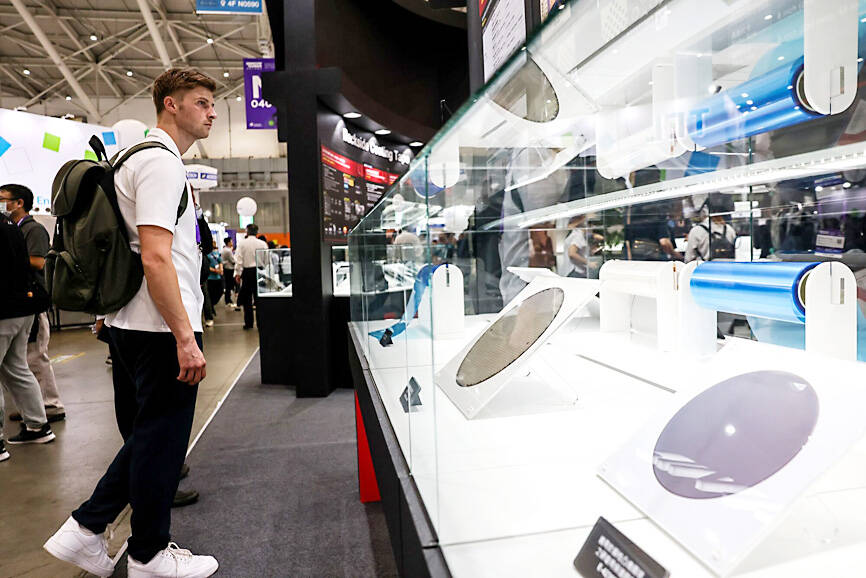The production value of Taiwan’s semiconductor industry in the third quarter rose about 9 percent from a quarter earlier, as the industry benefited from peak-season effects, the Industrial Technology Research Institute (ITRI, 工業技術研究院) said on Friday.
Output in the third quarter stood at NT$1.38 trillion (US $42.42 billion), up from NT$1.27 trillion in the second quarter, the government-funded institute said in its IEK Current Quarterly Model report.
Within the chip industry, the IC manufacturing segment recorded the best performance from July to September, with production value rising 11.1 percent from the previous quarter to NT$896.5 billion, the report showed.

Photo: I-Hwa Cheng, Bloomberg
The IC packaging service segment came in second, rising 9 percent to NT$111.4 billion, followed by IC testing service providers, which posted NT$50.5 billion, up 4.3 percent, the report showed.
The IC design segment ranked fourth, climbing 4.2 percent to NT$325.6 billion, the institute said.
The four segments of the local semiconductor industry are expected to see output grow in the fourth quarter, with output value increasing 6.9 percent sequentially to NT$1.48 trillion, it added.
This year, the local semiconductor industry is expected to post NT$5.3 trillion in production value, up 22 percent from last year, with growth in chip manufacturing, design, packaging and testing estimated to rise 27.5 percent, 16.5 percent, 8.6 percent and 5.2 percent respectively, the ITRI said.
Analysts said Taiwan Semiconductor Manufacturing Co (TSMC, 台積電), the world’s largest contract chipmaker, would serve as a driver to growth in the local IC industry this year, on the back of robust demand for its advanced 3-nanometer and 5-nanometer processes following the current boom in artificial intelligence development.
At an investors’ conference earlier last month, TSMC forecast that sales this year would grow almost 30 percent from last year in US dollar terms, up from its previous estimate of 24 to 26 percent growth.

Vincent Wei led fellow Singaporean farmers around an empty Malaysian plot, laying out plans for a greenhouse and rows of leafy vegetables. What he pitched was not just space for crops, but a lifeline for growers struggling to make ends meet in a city-state with high prices and little vacant land. The future agriculture hub is part of a joint special economic zone launched last year by the two neighbors, expected to cost US$123 million and produce 10,000 tonnes of fresh produce annually. It is attracting Singaporean farmers with promises of cheaper land, labor and energy just over the border.

US actor Matthew McConaughey has filed recordings of his image and voice with US patent authorities to protect them from unauthorized usage by artificial intelligence (AI) platforms, a representative said earlier this week. Several video clips and audio recordings were registered by the commercial arm of the Just Keep Livin’ Foundation, a non-profit created by the Oscar-winning actor and his wife, Camila, according to the US Patent and Trademark Office database. Many artists are increasingly concerned about the uncontrolled use of their image via generative AI since the rollout of ChatGPT and other AI-powered tools. Several US states have adopted

A proposed billionaires’ tax in California has ignited a political uproar in Silicon Valley, with tech titans threatening to leave the state while California Governor Gavin Newsom of the Democratic Party maneuvers to defeat a levy that he fears would lead to an exodus of wealth. A technology mecca, California has more billionaires than any other US state — a few hundred, by some estimates. About half its personal income tax revenue, a financial backbone in the nearly US$350 billion budget, comes from the top 1 percent of earners. A large healthcare union is attempting to place a proposal before

KEEPING UP: The acquisition of a cleanroom in Taiwan would enable Micron to increase production in a market where demand continues to outpace supply, a Micron official said Micron Technology Inc has signed a letter of intent to buy a fabrication site in Taiwan from Powerchip Semiconductor Manufacturing Corp (力積電) for US$1.8 billion to expand its production of memory chips. Micron would take control of the P5 site in Miaoli County’s Tongluo Township (銅鑼) and plans to ramp up DRAM production in phases after the transaction closes in the second quarter, the company said in a statement on Saturday. The acquisition includes an existing 12 inch fab cleanroom of 27,871m2 and would further position Micron to address growing global demand for memory solutions, the company said. Micron expects the transaction to